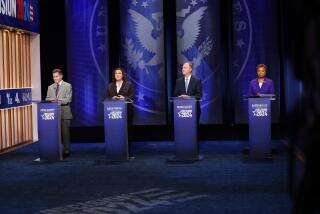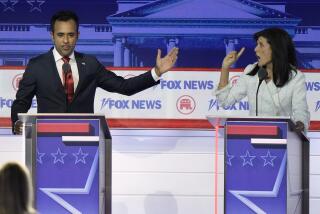Gore Charges Bush’s Policies Led to Gulf War
- Share via
WASHINGTON — Democratic vice presidential candidate Al Gore charged Tuesday that President Bush’s policy toward Iraq led directly to the Persian Gulf War and accused Bush of misleading the American public about how his Administration contributed to Baghdad’s prewar military buildup.
The strongly worded speech opened a concerted Democratic attack on Bush’s handling of Saddam Hussein and Persian Gulf policy in 1989 and 1990. Strategists close to Gore and Democratic presidential nominee Bill Clinton said the ticket will hammer away at the issue in the last five weeks of the campaign to counter Bush’s persistent references to Clinton’s draft record and to challenge Bush’s credibility.
“George Bush wants the American people to see him as the hero who put out a raging fire,” said Tennessee Sen. Gore in what was billed as a major speech. “But new evidence now shows that he is the one who set the fire. He not only struck the match, he poured gasoline on the flames.”
Until now, Clinton and Gore have made only occasional references to mounting evidence that the Administration tried to influence Iraq before the war with military and economic favors. Democrats clearly hope to use the issue to undermine one of Bush’s chief selling points for reelection--his experience and performance as a foreign policy leader.
The White House dismissed Gore’s remarks as it has earlier criticism of the President’s policy toward Iraq. “This is another effort by the Democrats in Congress to rewrite history to conceal their opposition to the war,” said White House Press Secretary Marlin Fitzwater.
In his speech, however, Gore made a point of noting that he had supported military action in the Persian Gulf when the issue came to a vote in the Senate. Democratic strategists said that vote and his prewar criticism of aid to Iraq were two reasons Gore was chosen to launch the attack on Bush.
Gore opened the strategy before a friendly audience at the Center for National Policy, a Washington research group with Democratic leanings. Invoking some of his harshest language of the campaign, Gore called Bush’s policy “amoral” and contended that “coddling tyrants” was a hallmark of Bush’s foreign policy.
“His poor judgment, moral blindness and bungling policies led directly to a war that never should have taken place,” Gore charged.
Gore, a member of the Senate Armed Services Committee, said U.S. assistance to Iraq by the Ronald Reagan Administration during the Iran-Iraq war may have been justified for strategic reasons until the war ended in August, 1988. But he said that the acceleration of U.S. aid by the Bush Administration reflected “truly atrocious judgment” by Bush.
He also challenged Bush’s statements that his Administration did nothing to help Iraq develop nuclear, biological and chemical weapons. Gore pressed Bush to “come clean” and acknowledge that American technology was used in Iraq’s weapons programs.
The text of Gore’s remarks contained 56 footnotes and relied heavily on disclosures in the press and Congress over the last 10 months concerning the extent of U.S. assistance to Iraq before the Gulf War and Bush’s role in orchestrating that aid as vice president and President.
Classified documents have shown that the Bush Administration sent sophisticated technology and economic aid to Iraq despite intelligence warnings that Hussein was developing nuclear, chemical and biological weapons. Administration officials often justified continuing the aid by citing a top-secret order issued by Bush in October, 1989, mandating closer ties to Baghdad.
Bush and senior Administration officials have acknowledged that the policy failed, but they have steadfastly defended it as an attempt to moderate Hussein’s behavior.
Bush campaign officials refused to comment on Gore’s remarks, but Bush criticized Clinton’s position on the Gulf War during a campaign swing through Gore’s home state of Tennessee.
Noting what he described as Clinton’s shifting positions on supporting and opposing the Gulf War and of withholding comment on a proposed free trade agreement with Mexico and Canada, Bush said: “If he ever became President of the United States--and he won’t--we’d have to replace the American eagle with a chameleon.”
(In January, 1991, after the Senate voted in favor of using force in the Gulf, Clinton said: “I guess I would have voted with the majority if it was a close vote. But I agree with the arguments the minority made.” As for the North American Free Trade Agreement, Clinton has said he will make no decision until he sees what its provisions are on job training and environmental protection.)
Some Democratic strategists had been pushing the Clinton campaign for months to take on Bush’s prewar dealings with Hussein, but campaign officials felt the issue was not as potent as the sagging economy. Party insiders said Bush’s recent attacks on Clinton’s draft record and new questions about Bush’s role in the Iran-Contra scandal led to the change in tactics.
Gore sought to link the failed Iraq policy with recent questions about the extent of Bush’s knowledge of the Iran-Contra scandal while he was vice president. Bush has said that he was “out of the loop” during discussions on swapping arms for hostages. Citing claims by former White House aides that Bush attended key sessions where the policy was discussed, Gore said Bush’s denials were no longer credible.
Democrats believe they can blend questions about Iraq and Iran with economic issues to portray Bush as a weak leader as the campaign heads into the final days. While Gore and Clinton do not plan remarks as extensive as Gore’s 45-minute speech Tuesday, campaign aides said they will bring up Iraq regularly from now on.
“This represents an effort to turn up the volume and we have no plans to turn it down,” said Marla Romash, Gore’s press secretary.
Times staff writer Edwin Chen, in Pennsylvania, contributed to this story.
More to Read
Get the L.A. Times Politics newsletter
Deeply reported insights into legislation, politics and policy from Sacramento, Washington and beyond. In your inbox twice per week.
You may occasionally receive promotional content from the Los Angeles Times.









